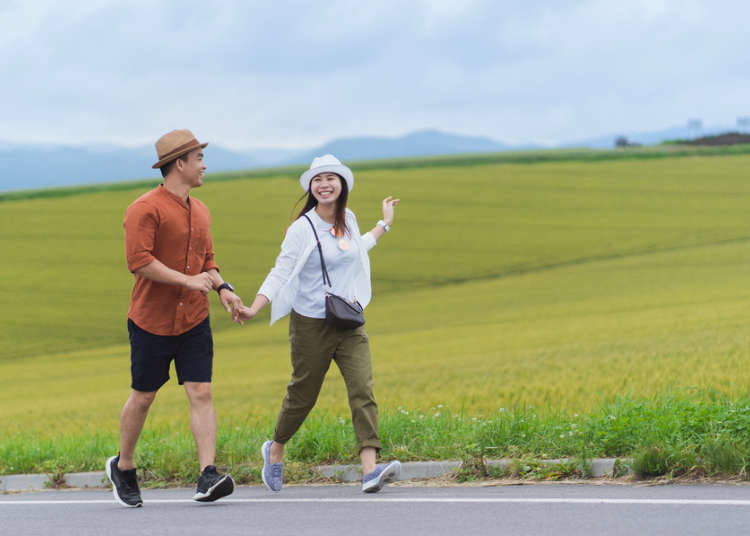
Visiting Hokkaido in Summer: What to Pack for Hokkaido in July and August
- Written by: Minna no Kotoba Sha
In July and August, Hokkaido is sunny and there are many summer days when the temperature is warm.
Hokkaido, Japan's northernmost island, is a great retreat for the summer. Depending on exactly where you are traveling to in the area, the clothing you need can vary greatly. It is good for you to be specific about travel plans so you can pack accordingly.
- Table of Contents
-
- Hokkaido is vast and has a large temperature difference depending on the area!
- In urban areas of Sapporo, the temperature is higher than it feels
- Depending on the terrain, the temperature may be higher in some areas
- The Pacific Ocean side - where you can see the 'Sea of Clouds' - is cool!
- Pay attention to the temperature difference between day and night in any area!
- Hokkaido in summer: enjoy spending time in nature
- Use proper gear when climbing mountains!
- Keep a light jacket in your bag - just in case!
Hokkaido is vast and has a large temperature difference depending on the area!
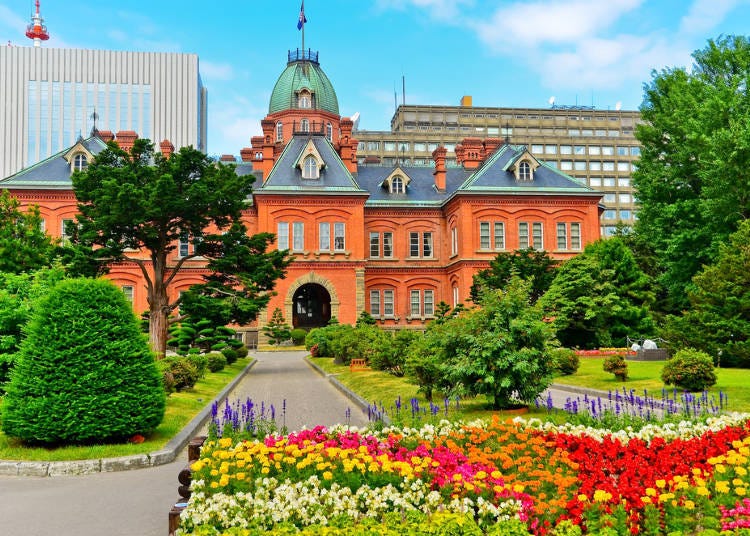
Hokkaido is 83,456 square kilometers, which is comparable to the size of Austria.
The area is surrounded by the Sea of Japan in the northwest, the Sea of Okhotsk in the northeast, and the Pacific Ocean in the south.
Mountains are to the east and to the west. Depending on where you are, the landscapes can be quite different.
In urban areas of Sapporo, the temperature is higher than it feels
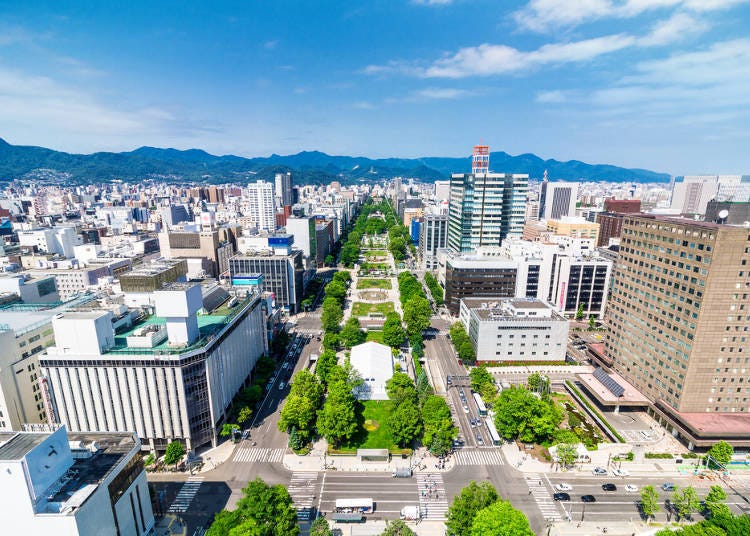
In many areas, it is not uncommon for temperatures in Hokkaido in summer to reach 25°C or higher in summer in July and August, or to reach mid-summer temperatures above 30°C.
In Sapporo, the largest city in Hokkaido, the heat island effect has been occurring in recent years, and the average maximum daytime temperature is 24.9°C in July and 26.4°C in August (average values from 1981 to 2010 announced by the Japan Meteorological Agency. Same reference below).
In urban areas, the temperature feels higher than the ambient temperature due to the glare, so it would be good to wear short-sleeved, sleeveless, and breathable clothing to keep you cool.
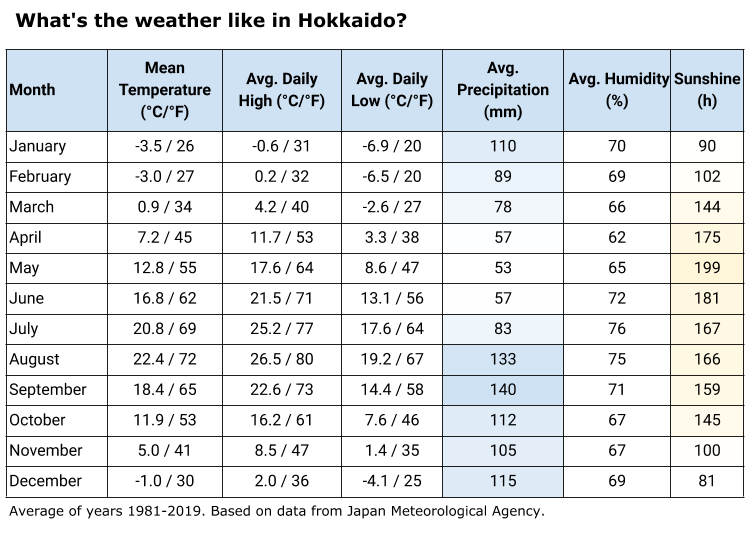
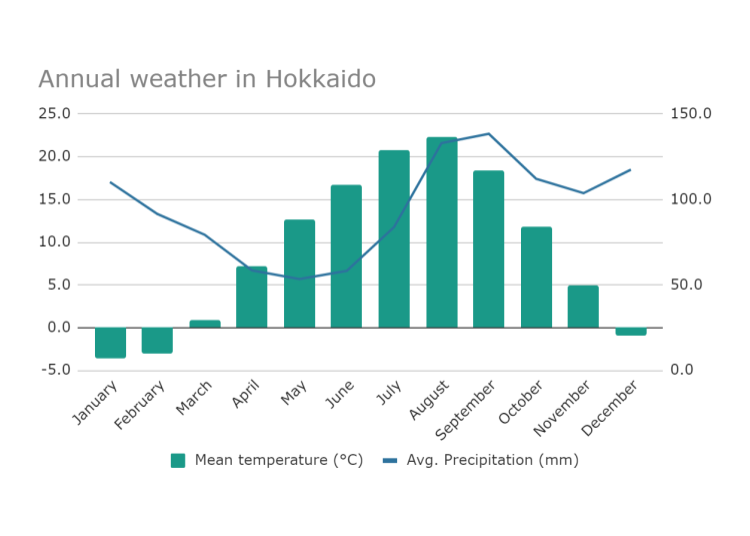
Depending on the terrain, the temperature may be higher in some areas
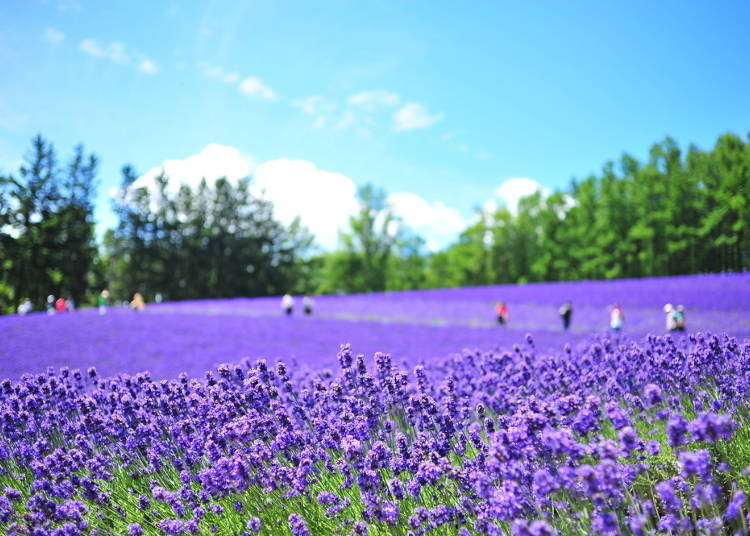
Even though overall Hokkaido has cooler temperatures, there are some areas that are prone to high temperatures. This is true in the Kamikawa basin, including Asahikawa and Furano. The average daytime maximum temperature in Asahikawa is 25.8°C in July and 26.3°C in August.
On the Sea of Okhotsk side, where the warm and dry winds over the mountains rapidly raise the temperature, the maximum temperature may exceed 30°C from May to June.
The southern part of the area, including Hakodate and Matsumae, has a climate close to Honshu. It tends to have many summer and midsummer days, so when going out, be sure to dress appropriately for the heat.
The Pacific Ocean side - where you can see the 'Sea of Clouds' - is cool!
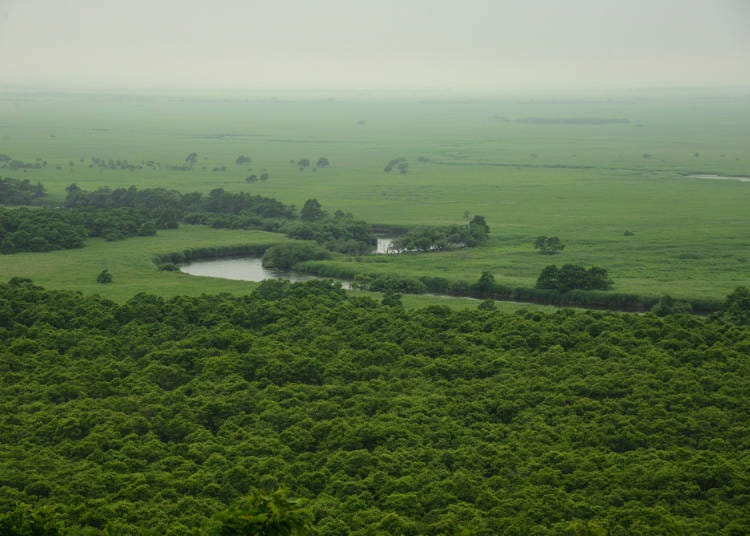
There are cool areas in Hokkaido in summer. On the Pacific Ocean side, warm and moist air from the South Pacific overhanging the Pacific High is often covered by a sea of clouds that is generated by cooling the cold (Oyashio current) seawater.
Due to this effect, in Kushiro, which faces the Pacific Ocean in Eastern Hokkaido, the average maximum temperature reaches 18.6°C in July and 21.2°C in August.
The temperature in the Soya region north of Hokkaido, which is affected by the Okhotsk Sea high that carries cold air, does not rise much. Unless you tend to run hot, sandals and short sleeves and bare feet will be chilly even during the day.
Pay attention to the temperature difference between day and night in any area!
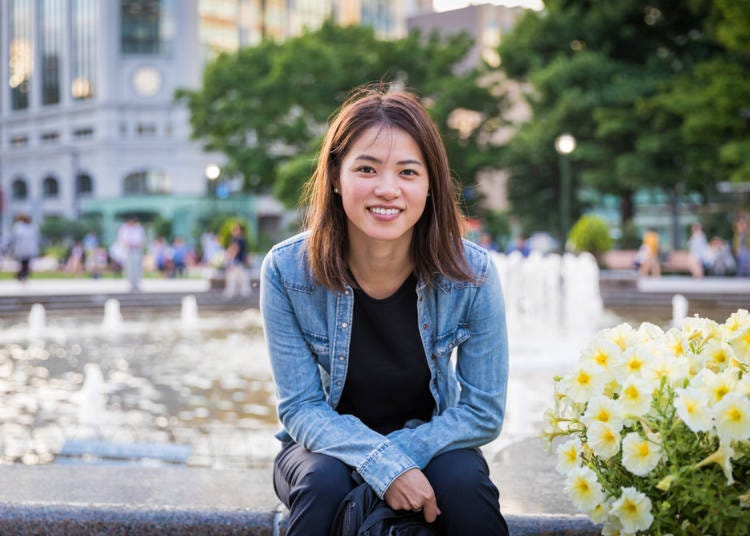
Even in Sapporo and Asahikawa where the temperature rises, be careful of the difference in temperature between day and night.
In Asahikawa, the average minimum temperature is 15.9°C in July and 16.8°C in August. Compared to the average maximum temperature, the temperature will rise and fall about 10°C in a day.
Even in Sapporo, where the temperature difference is not as severe as in Asahikawa, it can fluctuate by 6 - 7°C during the day, and the difference can become even greater depending on the weather. It is good to have clothing options such as a thin haori or light jacket to prep for temperature changes.
A light jacket also helps avoid strong sunlight on sunny days. It would be helpful to have a parasol.
Hokkaido in summer: enjoy spending time in nature
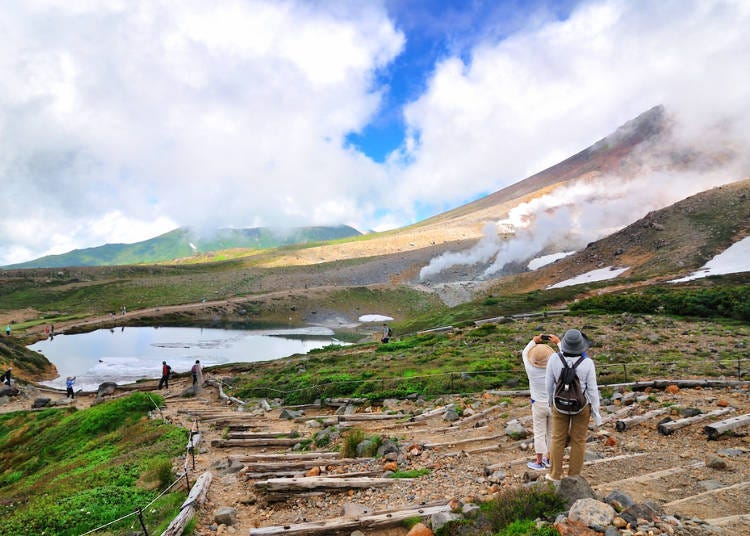
When visiting Hokkaido in summer, you should be sure to enjoy the glorious nature that abounds here. The sun is directly shining on the vast land and there are so many amazing views, such as rural areas, ranches, and flower spots. Be sure to have a wide-brimmed hat and sunglasses to protect your eyes.
When participating in the above-mentioned sight-seeing activities on rivers and lakes, walking in the forest, etc., wear long sleeves and pants even in summer.
It is an iron rule that bare skin does not appear in natural spots because some plants may give a rash when touched. There are also ticks and caterpillars that may bite. Being covered up also helps prevent sunburn and other injuries.
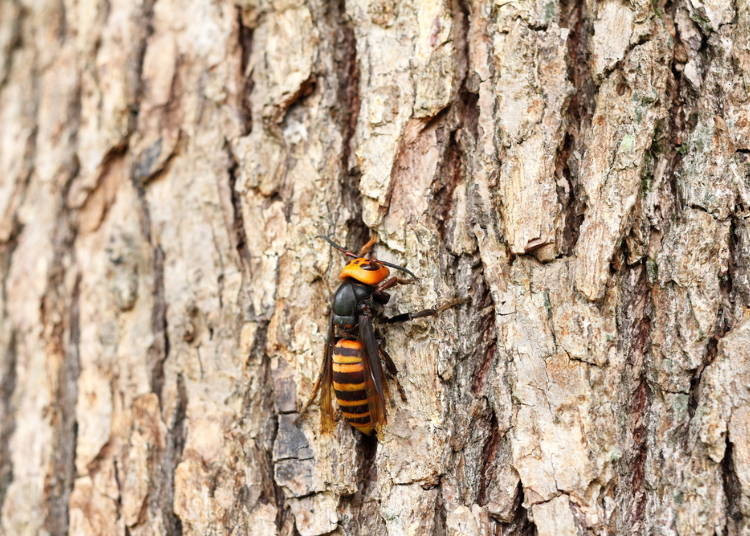
Another reason to avoid exposing your skin is to protect yourself from wasps. The peak is in autumn, but you will see them starting to fly around June.
Recently, more have been building nests in urban areas. Bees tend to attack darker colors due to their habit of being alert to foreign enemies such as brown bears. When you go to the mountains, be sure to not wear black outerwear.
Use proper gear when climbing mountains!
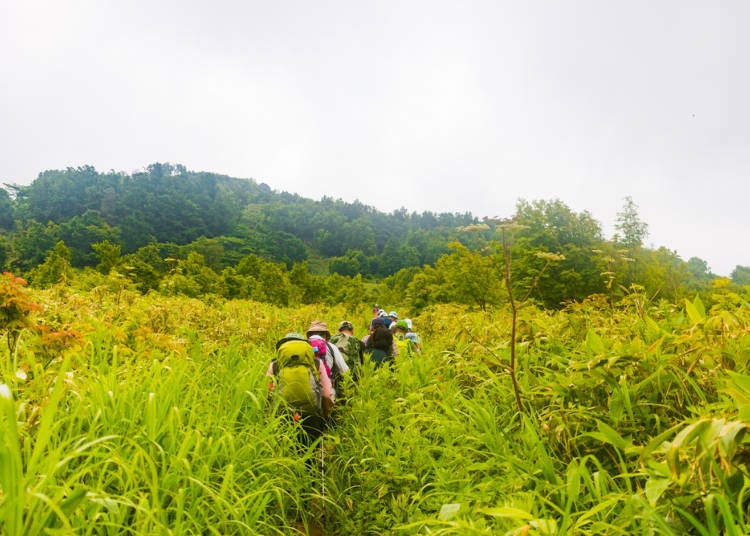
Climbing can be enjoyed in Hokkaido. It is at a high latitude, has a mountain climate, and it is said that the 2,000-meter mountain in Hokkaido is comparable to the 3,000-meter mountain in the Japanese Alps in Honshu.
There may be snowy areas even in the summer, so be sure to have suitable mountaineering shoes. Since the weather in the mountains can change a lot and without warning, it is essential to pack not only rain gear but also warm clothes such as layers and fleece.
Keep a light jacket in your bag - just in case!
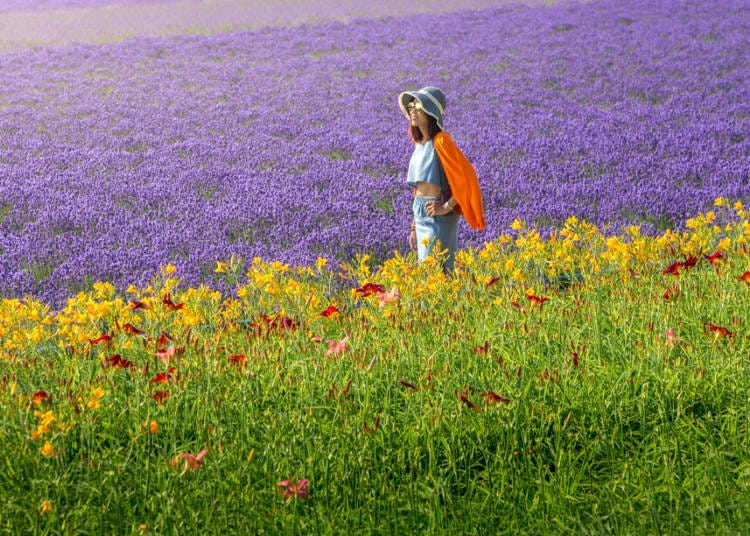
In recent years, Hokkaido in summer, which had tended to be, is no exception to climate change. Temperatures in northern Japan during the summer (June to August) have been above normal for the 10th consecutive year (see the Meteorological Agency announcement, Japan Regional Average Climate Table).
It is important to keep in mind heatstroke prevention measures such as wearing a hat when walking outside, paying attention to room temperature when staying at the hotel, and frequently consuming water and salt.
Summer in Hokkaido means the temperature changes drastically by day or night or depending on the destination. Even if it seems like you don’t need it when you go out, just to be on the safe side, you should carry a light jacket to enjoy your trip to the fullest while maintaining your energy and being at a comfortable temperature.
Text by Minna-no-Kotobasha
Minna no Kotoba Sha is a production company founded by an editor with extensive experience in editing local magazines in Sapporo. For over 20 years, our team has conducted research and written articles across Hokkaido, with Sapporo as our primary hub. Our diverse portfolio includes the production of various books such as travel guides, informational magazines, and collections showcasing the picturesque landscapes of Hokkaido. Comprised entirely of women, the team at Minna no Kotoba Sha boasts diverse interests, including a passion for travel, culinary delights, and alcoholic beverages. The scope of our communication efforts spans a wide range, covering everything from introducing notable restaurants to providing coverage of local events and sharing stories of leisure experiences.
- Area
- Category
*Prices and options mentioned are subject to change.
*Unless stated otherwise, all prices include tax.
Popular Tours & Activitiess
Recommended places for you
-
Appealing

Rukku and Uohei
Izakaya
Sapporo / Chitose
-
Appealing

Shirogane Blue Pond (Aoiike)
Rivers, Lakes & Canyons
Furano / Biei / Sounkyo
-

Niseko Village Ski Resort
Skiing & Snowboarding
Niseko / Rusutsu
-
Appealing

Sapporo Ramen Yokocho
Ramen
Sapporo / Chitose
-
Appealing

Mt. Hakodate Observatory
Forests & Mountains
Hakodate
-
Appealing

Shiroi Koibito Park
Theme Parks
Sapporo / Chitose
-
Ad

Smart Ways to Avoid Crowds and Enjoy a Safe, Comfortable Trip to Noboribetsu Onsen
-

Beyond Hakodate and Matsumae: Enjoy the Hidden Gems of Hokkaido’s Donan Area
-

BIGGEST SALE ALERT! SATUDORA Tax-Free Winter Sale: Stack Coupons for Massive Savings!
by: Guest Contributor
-

Expert-Recommended: 9 Hakodate Hotels Serving Up the Best Breakfasts in Town
by: Nobuka Kawashima
-

7 Iconic Hokkaido locations that will make your Instagram shine
by: Himanshi Shah
-
Ad

Sapporo SATUDORA Shopping Guide: Get Souvenirs, Medicine & More at This Iconic Drugstore (Special Deal Inside!)
-

Fun Summer Festivals and Events in Hokkaido (June/July/August 2025)
by: Masakazu Yoshida
-

Beat the Heat in Hokkaido: Top 5 Summer Adventures from Sapporo
by: Nobuka Kawashima
-

Asia's Longest Zipline! 'HANAZONO ZIP WORLD' Opens Summer 2022 in Hokkaido
by: Cassandra Lord
-

Hokkaido Lavender Fields: 6 Best Places in Furano to See Japan's Dreamiest Purple Meadows
by: Nobuka Kawashima
-

JR Edition: Visit all of Tokyo in one Day with the Tokyo Metropolitan District Pass!
-

Summer Fun in Hokkaido: Spectacular Landscapes, Dazzling Nights, Festivals & Essential Tips
- #best sushi hokkaido
- #things to do hokkaido
- #best ramen sapporo
- #what to bring to japan
- #new years in tokyo
- #what to buy in ameyoko
- #japanese nail trends
- #what to do in odaiba
- #onsen tattoo friendly tokyo
- #daiso
- #best sweets otaru
- #japanese fashion culture
- #best nature furano
- #japanese convenience store snacks
- #best japanese soft drinks













